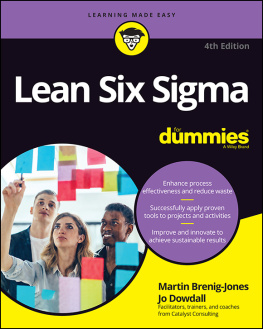Other titles in the Briefcase Books series include:
Communicating Effectively by Lani Arredondo
Performance Management, Second Edition by Robert Bacal
Managers Guide to Performance Reviews by Robert Bacal
Managers Guide to Crisis Management by Jonathan Bernstein
Recognizing and Rewarding Employees by R. Brayton Bowen
Sales Techniques by Bill Brooks
Motivating Employees, Second Edition by Anne Bruce
Building a High Morale Workplace by Anne Bruce
Design for Six Sigma by Greg Brue
Managers Guide to Marketing, Advertising, and Publicity by Barry Callen
Managers Guide to Planning by Peter J. Capezio
Leadership Skills for Managers by Marlene Caroselli
Negotiating Skills for Managers by Steven P. Cohen
Effective Coaching, Second Edition by Marshall Cook and Laura Poole
Conflict Resolution by Daniel Dana
Managers Guide to Strategy by Roger A. Formisano
Project Management, Second Edition by Gary Heerkens
Budgeting for Managers by Sid Kemp and Eric Dunbar
Hiring Great People by Kevin C. Klinvex, Matthew S. OConnell, and Christopher P. Klinvex
Managers Guide to Social Media by Scott Klososky
Time Management by Marc Mancini
Managers Guide to Fostering Innovation and Creativity in Teams by Charles Prather
Managers Guide to Navigating Change by Stephen Rock
Presentation Skills for Managers by Jennifer Rotondo and Mike Rotondo Jr.
Finance for Nonfinancial Managers, Second Edition by Gene Siciliano
The Managers Guide to Business Writing, Second Edition by Suzanne Sparks Fitzgerald
Skills for New Managers, Second Edition by Morey Stettner
Managers Survival Guide by Morey Stettner
The Managers Guide to Effective Meetings by Barbara J. Streibel
Managing Multiple Projects by Michael Tobis and Irene P. Tobis
Managers Guide to Online Marketing by Jason D. Weaver
Accounting for Managers by William H. Webster
To learn more about titles in the Briefcase Books series go to www.briefcasebooks.com

Copyright 2015 by McGraw-Hill Education. All rights reserved. Except as permitted under the United States Copyright Act of 1976, no part of this publication may be reproduced or distributed in any form or by any means, or stored in a data base or retrieval system, without the prior written permission of the publisher.
ISBN: 978-0-07-183864-1
MHID: 0-07-183864-3
The material in this eBook also appears in the print version of this title: ISBN: 978-0-07-183863-4, MHID: 0-07-183863-5.
eBook conversion by codeMantra
Version 1.0
All trademarks are trademarks of their respective owners. Rather than put a trademark symbol after every occurrence of a trademarked name, we use names in an editorial fashion only, and to the benefit of the trademark owner, with no intention of infringement of the trademark. Where such designations appear in this book, they have been printed with initial caps.
McGraw-Hill Education eBooks are available at special quantity discounts to use as premiums and sales promotions or for use in corporate training programs. To contact a representative, please visit the Contact Us page at www.mhprofessional.com.
Information contained in this work has been obtained by The McGraw-Hill Companies, Inc. (McGraw-Hill) from sources believed to be reliable. However, neither McGraw-Hill nor its authors guarantee the accuracy or completeness of any information published herein, and neither McGraw-Hill nor its authors shall be responsible for any errors, omissions, or damages arising out of use of this information. This work is published with the understanding that McGraw-Hill and its authors are supplying information but are not attempting to render engineering or other professional services. If such services are required, the assistance of an appropriate professional should be sought.
TERMS OF USE
This is a copyrighted work and The McGraw-Hill Companies, Inc. (McGraw-Hill) and its licensors reserve all rights in and to the work. Use of this work is subject to these terms. Except as permitted under the Copyright Act of 1976 and the right to store and retrieve one copy of the work, you may not decompile, disassemble, reverse engineer, reproduce, modify, create derivative works based upon, transmit, distribute, disseminate, sell, publish or sublicense the work or any part of it without McGraw-Hills prior consent. You may use the work for your own noncommercial and personal use; any other use of the work is strictly prohibited. Your right to use the work may be terminated if you fail to comply with these terms.
THE WORK IS PROVIDED AS IS. McGRAW-HILL EDUCATION AND ITS LICENSORS MAKE NO GUARANTEES OR WARRANTIES AS TO THE ACCURACY, ADEQUACY OR COMPLETENESS OF OR RESULTS TO BE OBTAINED FROM USING THE WORK, INCLUDING ANY INFORMATION THAT CAN BE ACCESSED THROUGH THE WORK VIA HYPERLINK OR OTHERWISE, AND EXPRESSLY DISCLAIM ANY WARRANTY, EXPRESS OR IMPLIED, INCLUDING BUT NOT LIMITED TO IMPLIED WARRANTIES OF MERCHANTABILITY OR FITNESS FOR A PARTICULAR PURPOSE. McGraw-Hill Education and its licensors do not warrant or guarantee that the functions contained in the work will meet your requirements or that its operation will be uninterrupted or error free. Neither McGraw-Hill Education nor its licensors shall be liable to you or anyone else for any inaccuracy, error or omission, regardless of cause, in the work or for any damages resulting therefrom. McGraw-Hill Education has no responsibility for the content of any information accessed through the work. Under no circumstances shall McGraw-Hill Education and/or its licensors be liable for any indirect, incidental, special, punitive, consequential or similar damages that result from the use of or inability to use the work, even if any of them has been advised of the possibility of such damages. This limitation of liability shall apply to any claim or cause whatsoever whether such claim or cause arises in contract, tort or otherwise.
Dedicated to Lauren Brue
for her unwavering support of my professional life.
This book was better because of you.
Thank you, my love!
Contents
, Mikel J. Harry
Foreword
O ver the last few decades, it has been my distinct privilege to serve as Greg Brues Six Sigma mentor. I have closely watched him extend and perfect his base of knowledge during the 90s, as evidenced by the increasing depth and scope of his many Black Belt projects. Owing to this solid technical foundation, others began to seek his advice and leadership.
During the early 90s, Greg focused his pursuit of Six Sigma by leveraging his leadership skills on the issues surrounding implementation and deployment over the course of his tenure at the Six Sigma Academy. Moving into the 21st century, Greg rightfully positioned himself as a true global leader on the playing field of Six Sigma. Today, he is forging new and original ideas from the solid ore mined from his past, as evidenced in this book.
Next page



